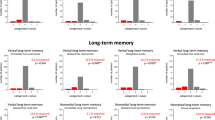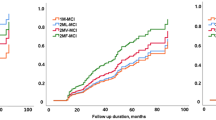Abstract.
Transient Global Amnesia (TGA) is a common condition of unknown aetiology characterised by the abrupt onset of severe anterograde amnesia, which lasts less than 24 hours. Some authors have suggested that subclinical impairment of memory functions may persist for much longer, but neuropsychological assessment lasting years after TGA attack has not been performed so far. The aim of this study was to evaluate longterm cognitive functions in patients with a previous TGA episode. Fifty-five patients underwent a standardised neuropsychological assessment after at least one-year from the TGA attack, and were compared with 80 age-matched controls. TGA patients showed worse performances on tests evaluating verbal and nonverbal long-term memory and attention, with comparable global cognitive functions. By applying current criteria for amnestic Mild Cognitive Impairment (MCI-a) on TGA subjects, a group consisting of 18/55 (32.7%) MCI-a subjects was identified. There was no association between the presence of MCIa and demographic variables, vascular risk factors, years since the TGA episode, or ApoE genotype. This study demonstrates that TGA appears to be a relatively benign syndrome although objective memory deficits fulfilling MCI-a criteria persist over time, as detected by multidimensional neuropsychological tasks performed at long-term follow-up.
Similar content being viewed by others
References
Hodges JR, Warlow CO (1990) Syndromes of transient amnesia: towards a classification. A study of 153 cases. J Neurol Neurosurg Psychiatry 53:834–843
Fisher CM (1982) Transient global amnesia. Precipitating activities and other observations. Arch Neurol 39:605–608
Quinette P, Guillery B, Desgranges B, de la Sayette V, Viader F, Eustache F (2003) Working memory and executive functions in transient global amnesia. Brain 126:1917–1934
Gallassi R, Stracciari A, Morreale A, Lorusso S, Rebucci GG, Lugaresi E (1993) Transient global amnesia: neuropsychological findings after single and multiple attacks. Eur Neurol 33:94–298
Hodges JR, Oxbury SM (1990) Persistent memory impairment following transient global amnesia. J Clin Exp Neuropsychol 12:904
Hodges JR, Warlow CP (1990) The aetiology of transient global amnesia. A case-control study of 114 cases with prospective follow-up. Brain 113:639–657
Kessler J, Markowitsch HJ, Rudolf J, Heiss WD (2001). Continuing cognitive impairment after isolated transient global amnesia. Int J Neurosci 106:159–168
Caplan LB (1985) Transient global amnesia. In: Fredericks JAM, ed. Handbook of Clinical Neurology,Vol 1(45). Amsterdam: Elsevier Science 205–218
Poirier J, Davignon J, Bouthillier D, Kogan S, Bertrand P, Gauthier S (1993) Apolipoprotein E polymorphism and Alzheimer’s disease. Lancet 342:697–679
Petersen RC, Smith GE, Waring SC, Ivnik RJ, Tangalos EG, Kokmen E (1999) Mild cognitive impairment: clinical characterization and outcome. Arch Neurol 56:303–308
Hodges JR, Ward CD (1989) Observations during transient global amnesia: a behavioural and neuropsychological study of five cases. Brain 112:595–620
Kritchevsky M, Squire LR (1989) Transient global amnesia: evidence for extensive, temporally graded retrograde amnesia. Neurology 39:213–218
Regard M, Landis T (1984) Transient global amnesia: neuropsychological dysfunction during attack and recovery in two “pure” cases. J Neurol Neurosurg Psychiatry 47:668–672
Kritchevsky M, Squire LR, Zousounis JA (1988) Transient global amnesia: characterization of anterograde and retrograde amnesia. Neurology 38:213–219
Author information
Authors and Affiliations
Corresponding author
Rights and permissions
About this article
Cite this article
Borroni, B., Agosti, C., Brambilla, C. et al. Is transient global amnesia a risk factor for amnestic mild cognitive impairment?. J Neurol 251, 1125–1127 (2004). https://doi.org/10.1007/s00415-004-0497-x
Received:
Revised:
Accepted:
Issue Date:
DOI: https://doi.org/10.1007/s00415-004-0497-x




